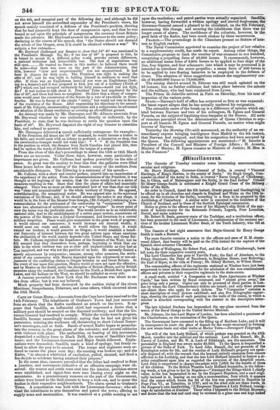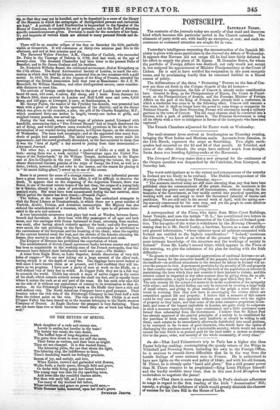iflistellantous.
The Gazette of Tuesday contains some interesting announcements, secular and religious.
Sir Henry Hardinge' Governor-General of India, is created "Viscount King'sHardinge, of King's Newton, in the county of Derby." Sir Hugh Gough, Com- mander-in-chief of the Army in India, is created "Baron Gough, of Chinkeang- foo, in China, and of Maharajpore and the Sutlej, in the East Indies." Colonel' Sir Henry George Smith is nominated a Knight Grand Cross of the Military r Order of the Bath.
An order in Council, dated the 6th instant, directs prayer and thanksgiving to be offered up in all churches and chapels in England and Wales on the 12th in- stant, for the victories of the Sutlej ; according to a form to be prepared by the Archbishop of Canterbury. A similar order is conveyed to the ministers of the Church of Scotland, and to those of the Scottish Episcopal communion. Notice is given to the officers and men of her Majesty's ship Brisk of the pay- ment of bounty-money for the Raimundo Primero, Leger's, Four Lot:inches, Nereid, and name unknown. Mr. Robert B. Beale, gunnery-mate of the Trafalgar, and a meritorious officer, has been promoted to the rank of Lieutenant, in consideration of the eminent ser- vices of his brother Lieutenant Walter Beale, of the Tenth Infantry, who fell at Sobraon.
The Gazette of last night announces that Major-General Sir Henry George Smith is made a Baronet.
The same Gazette contains a notice to the officers and crew of H.31. steam vessel Albert, that bounty will be paid on the 27th instant for the capture of the Spanish slave-schooner Clementia.
The Duke of Wellington, Sir Robert Peel, and the Earl of Ellenborongh, have left town for their respective country seats. The Lord Chancellor has gone to Turville Park; the Earl of Aberdeen, to the Priory, Stanrnore; the Duke of Baceleuch, to Boughton House, near Kettering; the Earl of Ripon, to his villa at Putney; Mr. Sidney Herbert, to Wilton House.
The commanding officers of the regiments stationed at Windsor have just been empowered to issue orders themselves for the admission of the non-commissioned officers and privates in their respective regiments to the state-rooms.
A small work, entitled "A Companion to the State Apartments at Windsor Castle," has been written by Royal command, and "almost given away," the price being only a penny. Copies can only be procured of those parties in Lon- don by whom the Lord Chamberlain's tickets are issued; and only those persona can obtain them who apply for such tickets. The "Companion" contains a. short description of every picture exhibited; and also five lithographic engrav- ings showing the position of each painting on the walls of the rooms, to which a- nunler is attached corresponding with the number in the descriptive letter- press.
The late Admiral Durham has bequeathed the spy-glass recovered from the' wreck of the Royal George to the United Service Museum.
Mr. Johnson, the late Lord Mayor of London, has been admitted a pensioner of the Charterhouse, on the nomination of the Queen.
The Government have consented to the filling up of Keyham Lake; and it will- in consequence be made the place of deposit for the waste excavated in forming the new steam-basin and other works at Morice Town.—Devonport Telegraph.
The will of the late Lady Holland, of which probate was granted on the 16th March, ramifies into the political and the national. Lord John Russell, Mr. B. Currey of London, and Mr. W. A. Loch of Edinburgh, are the executors. The personality in England was sworn under 80,0001. To the Queen is bequeathed a picture of the Duke of York. To Lord John Russell, the net proceeds of the Kennington estate for life, and the residue of Lady Holland's property not speci- ally disposed of; with the remark that the bequest entirely emanates from sincere affection to his Lordship, and that the late Lord Holland intended to bestow a si- milar compliment upon him as regarded the reversion of the Ampthill estate- Lord John is empowered to charge the estate with 7,0001. for the benefit of threa of his children. To the British Museum Lady. Holland bequeaths, in the follow- ing words, a box given to her by Napoleon—" Amongst the things which I chiefly value, is the box bequeathed to me by the Emperor Napoleon, and a card origi- nally enclosed in it, bearing on one side a memorandum, from which it appears that the cameo which forms the lid of the box was presented to Napoleon by Pope Pius VI., at Talentino2 in 1797; and on the other side are these words, in the Emperor's own handwriting, L'Empereur Napoleon Lady Holland, temoig- nage de satisfaction et d'estime." These relics I bequeath to the British Museum; and desire that the box and card may be enclosed in a glass case and kept locked
sp, so that they may not be handled, and to be deposited in a room of the library of the Museum in which the autographs of distinguished persons and curiosities are kept." A portrait of Lord Dunfermline is bequeathed to the Speaker of the House of Commons, to complete his set of portraits; and to the Earl of Aberdeen specific remembrances are given. Provision is made for the members of her fami- ly; and bequests of various kinds are allotted to many personal friends and de- pendents.
There will be an annular eclipse of the Sun on Saturday the 25th, partially visible at Greenwich. It will commence at thirty-two minutes past five in the afternoon, and end at four minutes past six.
The P.everend Walter Fletcher A.M., Chancellor of Carlisle who succeeded Dr. Paley. in the Vicarage of Daston in 1793, died last weei, at the age of seventy-mne. The deceased Chancellor had been tutor to the present Duke of Beaufort, and to Sir James Graham and his brothers.
Dr. Frederick Wilhelm Bessel, the celebrated astronomer, died at Konigsberg on the 17th ultimo. The Royal Astronomical Society of London, to mark the esti- mation in which they held his labours, presented him on two occasions with a gold medal. In 1842, Dr. Bessel, at the request of the King of Prussia, attended the meetings of the British Association herd that year at Manchester: Sir J. F. W. Herschel], Sir William Hamilton, and other distinguished sevens, came consider- able distances to meet him.
The arrivals of foreign cattle duty-free in the port of London last week num- bered 66 oxen, 134 cows, 4 calves, 435 sheep, and 1 lamb. From January 1st to March 28th, there arrived in London and Hull 3,488 oxen and cows, 6,818 sheep, and 153 pigs; at Liverpool, 2 oxen; at Southampton, 4.
Mr. George Payne, the master of the Pytchley fox-hounds, was presented last week with apiece of plate by the sportsmen of the district; and at the dinner which was given on the occasion, a pike the gift of Sir Charles Knightley, M.P. which measured forty-one inches in length, twenty-one inches in girth, and weighed twenty pounds, was served up.
During the last week, some wicked wags of printers posted Liverpool with 'handbills, announcing that a "Don Edward Hansen" had at length discovered the art of flying, and would perform some wonderful gyrations in the air for the en- tertainment of our wonder-loving inhabitants, in Clayton Square, on the afternoon of Wednesday. The hoax took amazingly; and at the appointed time many hun- dreds of people had assembled. The aerial voyager, however, never made his appearance; and the crowd gradually diminished, as the fact occurred to them that it was the "first of April," a day sacred to jesting from time immemorial.— Liverpool Journal. The other day, a person purchased a packet of books at a stall in Hol- born: among them was a work entitled "Observations upon the United Pro- vinces of the Netherlands," by Sir William Temple, Ambassador to the Hague suid at Aix-la-Chapelle in the year 1668. On inspecting the volume, the pur- chaser discovered fourteen guineas of the reign of George the First, as well as a letter, (which, however, did not refer to the money, nor the reason for placing it in "its secret hiding-place,") sewed up in one of the covers.
Borne is at present the scene of a strange rumour. As very influential persons have a great interest in concealing the affair, it will be difficult to discover the truth. It appears that on the reopening of the Argentina Theatre, there was found, in one of the most remote boxes of the last class, the corpse of a young lady in a domino, already in a state of putrefaction, and bearing marks of several poniard stabs. She must have been assassinated during the last carnival, since Which period the theatre has been closed.—Brussels Paper.
The Sultan, at the request of Reschid Pacha, has authorized strangers to visit the Royal Library at Constantinople, in which there are a great number of Turkish, Arabic, Persian, and Armenian manuscripts. His Majesty has also .ordered the establishment of a museum, which will be open to all persons inter- ested in the arts and sciences.
Avery lamentable occurrence took place last week at Werden, between Sarre- brouck and Sarralonis. A ferry-boat with fifty passengers of all ages and both sexes, and two carriages with horses harnessed to them returning from market, was sunk, after having struck violently against the brink; and only five persons were saved, the rest perishing in the Sarre. This catastrophe is attributed to the carelessness of the ferryman and the breaking of the chain; when the rapidity of the current hurried away the boat, and the shrieks of the females alarming the horses, they moved to one side of the boat, which overbalanced and sunk. The Emperor of Morocco has prohibited the ex rtation of wheat.
The establishment of florets (small agreement-' . .ks between master and man) 'has been so unpalatable to the ;working-men of the French metropolis, that Go- vernment have delayed their introduction until next year.—The Builder. A letter from Eagle River, on Lake Superior, details discoveries of very rich lodes of copper—" We are now taring out a large amount of the silver rock, having struck it at the depth of sixty feet. The diggings have never looked so well since I have known them as at present, and I feel confident they will im- prove as we progress. I have now a party of men at work on the Bluffs.? on a well-defined vein of forty feet in width. At Copper Falls they are in a fair way to astonish the world. Childs has struck a mass of native copper in the centre of his shaft, which extends entirely across the shaft ten feet, and is equally large -where it enters the rock as at any part of the mass. He has sunk over nine feet on the side of it without any appearance of coming to its termination in that di- rection. At the Pittsburgh Company's work on the Bluffs they have a rich and well-defined vein. The North American Company have a good prospect Their location takes the rich vein of the Pittsburgh Company in less than half a mile from the richest point on the vein. The vein on which Mr. Childs is at work Copper Falls) has been traced on to the location belonging to the North-western
pany of Detroit At Eagle Harbour the prospect is very flattering. There are not more than two or three locations where they are at work but what look



























 Previous page
Previous page